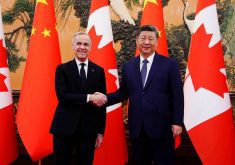When United States President Donald Trump announced that nearly every country in the world was subject to new tariffs on April 2, Canada and Mexico weren’t on the list.
That’s because the U.S. decided to leave previous tariffs against their neighbours on the books and left products under the Canada-U.S.-Mexico Agreement unaffected — for now. For Canada’s canola market, it was the best news in weeks.
In March, China announced it would subject Canadian canola oil and meal imports, among other products, to 100 per cent tariffs in retaliation for Canada’s similar tariffs on Chinese electric vehicles. This caused the May canola contract on the Intercontinental Exchange to fall nearly $90 in the 10 days after the announcement to $556 per tonne. However, tight supplies, weakness in the Canadian dollar and strength in vegetable oils helped canola recover more than $50 in two weeks.
Read Also

Weed resistance closes in on glufosinate
Expanded soybean acres and tighter application windows have eroded buffers that have so far protected Liberty herbicide on Prairie farms
While other markets tumbled, May canola independently gained $9.40 per tonne on April 4 to close at $635.90. It was the contract’s highest close since March 7, the same day China announced its tariffs.
There are possibilities for canola prices to rise further. April to June is the seasonal price peak for the oilseed and the potential for greater export demand could tighten Canada’s supply even more.
Chicago soyoil also helped lift canola prices, especially after U.S. Department of Agriculture Secretary Brooke Rollins announced on April 2 that US$537 million in funding would be used towards biofuel infrastructure despite Rollins and the Trump administration still lacking a clear biofuel policy.
But a near-complete, record-breaking South American soybean harvest will pressure prices in the Chicago soy complex and increase China’s export demand from South America while taking that away from the U.S. With the U.S. placing an additional 34 per cent levy on Chinese goods, retaliation came a couple of days later, with a matching tariff on its U.S. imports.
For canola, the fact remains that the oil and meal remain significantly shut out from its two biggest markets, the U.S. and China. The latter could place tariffs on canola seed, which has been exempt so far, triggering another crisis in the Canadian industry.
Considering the wild-card ways of the Trump administration and the now realistic possibility of a global recession, those looking for long-term gains in canola shouldn’t hold their breath.
















